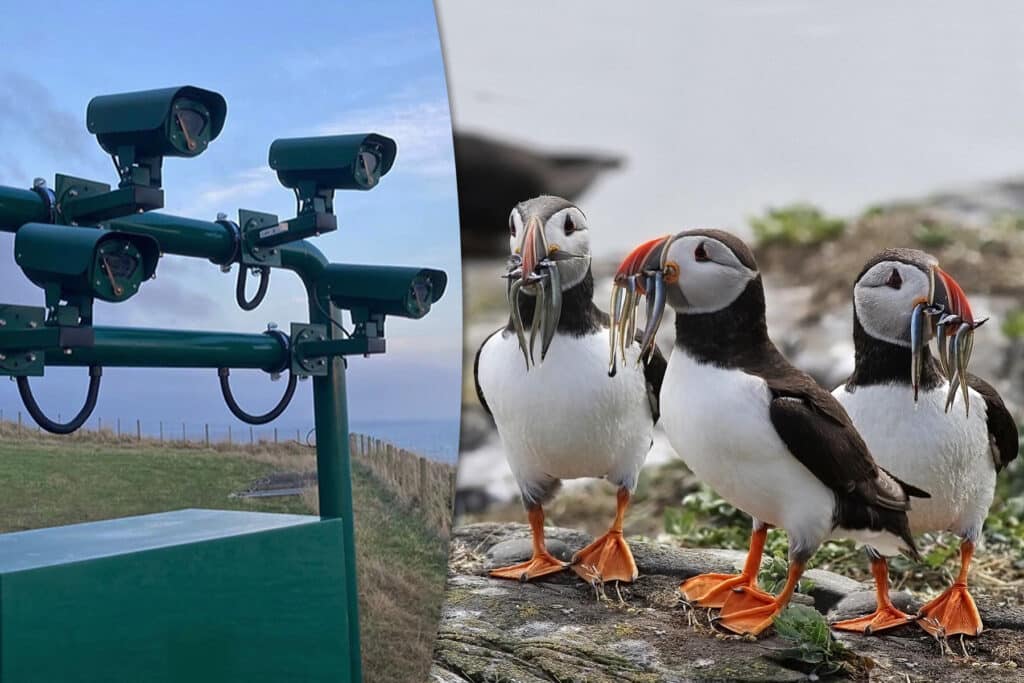360 Vision Technology, a manufacturer of hybrid, radar and thermal imaging cameras, has partnered with Excite Technology, to deliver a species monitoring and data delivery solutions.
In partnership with specialist environmental and conversation technology consultancy, Excite Technology, 360 Vision Technology has supplied their stainless-steel Eclipse HD cameras for a number of harsh environment species trial monitoring applications, for Scottish and Southern Electricity Renewables (SSE Renewables) sites.
Multi-sensory technologies
Taking up the story, Jason Williams, Director of Business Development at Excite Technology explains: “Working in some of the harshest environments on earth, Excite Technology has developed a variety of efficient techniques for monitoring offshore wildlife. SSE Renewables, who develop and operate wind farms, asked us to support them in reducing their impact on habitat and the natural environment through developing a solution to monitor puffin breeding activities around their offshore wind farm installations.
“Our brief was to capture live high-definition video images of puffins visiting their burrows and deliver this data for image recognition using artificial intelligence, machine learning, and image recognition, to accurately count and record their populations.
“We were challenged to design and build a system that would endure the rugged and remote marine environments. Our equipment would have to survive high humidity, salt air and gale-force winds over many years, whilst continuing to provide high quality, consistent data, with video files uploaded to a secure server via local storage and either a 4G cellular or satellite internet connection.
“To successfully implement the project and prevent severe corrosion, we deployed the robust 360 Vision Technology Eclipse camera, with its marine-grade stainless steel enclosure, low-power consumption, on-board recording, built-in anti-condensation heaters and self-cleaning screen wiper/washer.”
Protecting the environment
SSE aims to protect the environment as it delivers a £4m of investment in low-carbon energy and electricity infrastructure over the next five years, and helping SSE achieve their goals, the 360 Vision Technology/Excite solution has recently been tested during the puffin breeding season on the Isle of May, in the Firth of Forth. Four Eclipse cameras in position on the island gathered footage and automatically detected and counted the seabirds. It is expected that the technology will be used for a number of species recognition projects around Scottish & Southern Electricity (SSE) sites, including hydro power stations and wind farms.
Rachel McEwen, SSE’s Chief Sustainability Officer, said: “As a leading generator of renewable electricity and one of the largest electricity and one of the largest electricity network companies in the UK, our assets can have far reaching consequences across a wide range of issues, from reducing the effects of global climate change to supporting local habitats.”
“The impacts of our hydro and wind farm operations and our transmission and distribution networks need to be actively managed. The are incredible opportunities to be had in protecting and enhancing existing and new habitats as we harness natural resources, such as water and wind for renewable energy generation.”
“Its our ultimate aspiration that this incredible cutting edge technology could be deployed in a variety of different settings to monitor species of interest in the future.”
As the investment in renewable energy continues, its ever more important to ensure that development, like windfarms, are not having any detrimental environmental effects. “With SSE Renewables, ew seized an opportunity with Excite Technology to use our robust cameras and their AI technology together, to more accurately and efficiently, and less invasively, monitor the wellbeing and breeding habits of the puffins that are attracted to this particular area on the Isle of May,” says Tony Holloway, BDM at 360 Vision Technology. “There are exciting possibilities for further development of the species monitoring solution. For example, to track activity at individual breeding burrows or overcome some of the trickier aspects of seabird monitoring, such as the remoteness and weather to be found at other sites. This would enhance the understanding of seabird populations and their interactions with human activities, helping SSE Renewables to manage and monitor marine developments, in particular, to secure renewable energy to address climate change while also safeguarding biodiversity.”
For more information on their range of rugged HD, hybrid, radar and thermal imaging cameras, you can visit www.360visiontechnology.com






